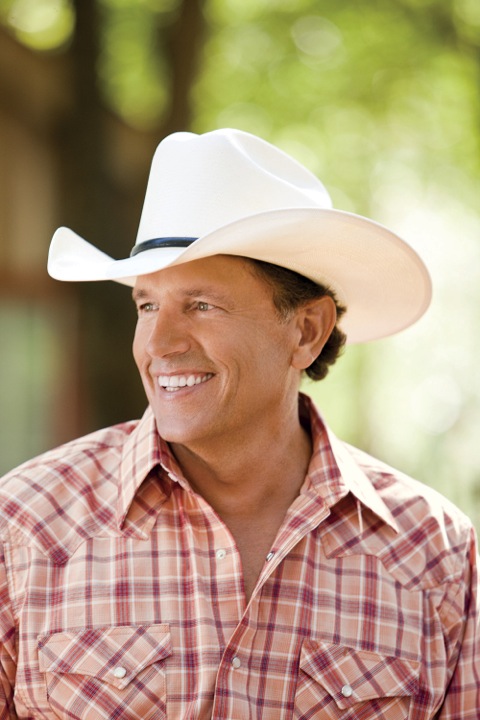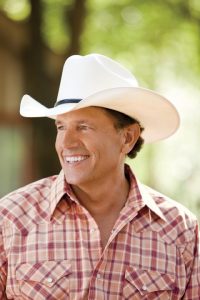George Strait: The end of the trail (or so they say)
By Holly Gleason
(LSM May/June 2014/vol. 7 – issue 3)
 “Sometimes I feel like Jesse James, still trying to make a name
“Sometimes I feel like Jesse James, still trying to make a name
Knowing nothing’s gonna change what I am
I was a young troubadour when I rode in on a song
And I’ll be an old troubadour when I’m gone …”
And so, they say it’s over. Or fixing to be. June 7 in Arlington, Texas: the final show with almost too many guests to name, then — truly — the Cowboy Rides Away. For good.
Or so they say, but it’s hard to believe. George Strait has been a fixture at the top of the country music game for well over 30 years, winning awards, creating indel- ible singles, and defining what it means to be a classic country star for large chunks of two different centuries.
Maybe it says something about the state of our tailgate/moonlight/cold beer/ hot night/hotter babe nation. For whatever reason, King George — a man who reveres Lefty Frizzell, Merle Haggard, George Jones, Hank Thompson, and Bob Wills — has decided to pack it up. When he does, he takes with him dignity, el- egance, understatement, top-shelf songs, and a focus on the music, not the man or the mayhem.
Just consider the hits: “All My Ex’s Live in Texas,” “The Fireman,” “Does Fort Worth Ever Cross Your Mind,” “Ocean Front Property,” “Give It Away,” “The Chair,” “Marina Del Ray,” “Unwound,” “Chill of An Early Fall,” “Carried Away,” “She’ll Leave You with a Smile,” “Write this Down,” “Fool Hearted Memory,” “I Just Wanna Dance with You,” “I Can Still Make Cheyenne,” “Run,” “Amarillo By Morning” … and on and on. There are 50 No. 1’s on one Strait collection, and 22 more hits on another.
Listen to “Troubadour,” a No. 1 from 2008, and understand that honoring the life, the rooms, the music was everything that made Strait who he was. To him, mu- sic was about distilling the essence of the post-cowboy romanticism, iconicism and easy-going virility that defined being a Texan and a stand-up guy.
Heck, when Strait strode onstage in a white hat at the 1999 CMA Awards to the flourish of twin fiddles and was joined by Alan Jackson for the pointed “Murder On Music Row,” it was a mo- ment that decried the loss of traditional country in the rock/pop crossover blitz. So topical and in the moment then, but also prescient about the state of country music today.
And yet Strait’s music still holds its own and finds its way against the status quo tide, and those hits of his just keep on coming. “I’ve Got a Car,” currently headed to the top of the country charts, demonstrates there’s no loss of enthu- siasm for the man who won the 2013 Country Music Association Entertainer of the Year Award in the midst of what’s being billed as his final tour. If those Entertainer of the Year Awards, won in the ‘80s, ‘90s and ‘10s, are about being an artist who’s brought country music to the farthest reaches of our global culture, Strait’s earned ’em. More than being a judge on a talent contest, or wearing his jeans just so (though ladies sure like the way Strait fills out his Wranglers), the taciturn Texan has been places no country star had since Willie Nelson.
Like Willie, who held down starring roles in Electric Horseman and Honey- suckle Rose, Strait even anchored his own box office hit, Pure Country. Playing Dusty Chandler, a superstar who eschews arena-sized success, Strait explored what anchors “real” country in the face of the established himself as a matinee idol while watching the soundtrack spend weeks atop Billboard’s Country Albums chart en route to selling six million copies and serving up two No. 1 singles.
Strait’s success reflected the power of strong music, a clean image, and main- taining one’s dignity. Long before he was hailed as “King George,” Strait quietly filled arenas, sold in heavy-metal num- bers, and early adopted seminal song- writers Dean Dillon, Jim Lauderdale, John Prine, Bruce Robison, and Jamey John- son, as well as classicists Buddy Cannon, Guy Clark, Frank Dycus, Dallas Frazier, Red Lane, Dicky Lee, Sanger D. “Whitey” Shafer, and Sonny Throckmorton. He also helped bring country music into major stadiums with his Country Festival Tours in the ’90s. Uniting some of the genre’s biggest names — Alan Jackson, the Dixie Chicks, Tim McGraw and Faith Hill in their prime — with tasty acts like Asleep at the Wheel and Lee Ann Womack, Strait’s Texas-sized traveling festival was a survey course in what real country should be.
What country music loses when the man who can ride, rope, rodeo, fish, hunt, and act like a genuine gentleman leaves the road is a sense of authenticity. Not someone flexing their “lifestyle” as a brand extension, but an artist who draws as much from Frank Sinatra’s gift as a stylist as he does from being the high-water mark of Ray Price embodied.
Somewhere along the horizon, of course, Strait will punctuate what it means to retire with his legacy intact. Unlike “Electric Horseman” Robert Redford in his suit of electric lights, drawn in for the money and the last gasp of fame, or Strait’s own Dusty Chandler needing desperately to get back home, he will return to a place where the footlights fade and life emerges — and he can let the music, the moments, the memories do the work rather than shamelessly aping for ap- plause or chasing bad trends down dark alleys in the name of irrationally trying to hold on to something that is so far beneath him.
Maybe that’s what set Strait apart. Rather than trend, tilt, or tumble, he knows his strengths — and he can walk away at the top of his game. Never staying too long at the party, he leaves his legacy shining as bright as ever, reminding anyone who’s paying attention that the kind of music that endures comes from an artist’s core, maintains a standard of excellence, and should never be drowned in cheap tricks, pyro, or costume changes.
Let’s hope Nashville remembers. If not why, then at least the man who embodied so much of what the genre is made of. Otherwise, it’s gonna be a long rest of forever on the country dial.







Im a male, 85 years old.
I hope I pass before George Strait does.
All my country heros are about gone.
George and Allen are about the only ones left.
Murder on Music Row says it all.
I have been so blessed I the 50 and sixty year.
Steel guitars, fiddle and acoustic guitars.
I today never turn on a radio station. It all trash and besides , you can’t Hear the words due to th stupid electric guitars.